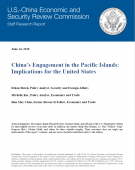×
Filter Results
Filter Results

Staff Paper
Since President Xi took office in 2013, Beijing has significantly bolstered its involvement in the Pacific Islands region, which comprises three U.S. territories and three countries freely associated with the United States that are important for U.S. defense interests in the Indo-Pacific. Much of China’s engagement in the region has focused on expanding economic ties with the Pacific Islands, but it has also increased its footprint in the diplomatic and security realms. This report examines China’s interests in the region, its comprehensive engagement in the Pacific Islands, and the implications of its expanding presence and influence for the United States.
Research
In February 2015, China and Argentina announced prospective weapons sales and defense cooperation agreements extending beyond the scope of any made between China and a Latin American nation to date. These plans include Argentina’s purchase or coproduction of 14-20 fourth-generation fighter aircraft, at least 100 armored personnel carriers, and five naval vessels; enhanced military-to-military exchanges; and China’s construction in Argentina of a space tracking facility in conjunction with satellite imagery sharing. If fulfilled, these agreements would vastly surpass China’s previous regional arms exports in value and achieve several new benchmarks in the breadth, competitiveness, and technological sophistication of its regional arms sales; altogether representing a new phase in China-Latin America defense engagement. These developments would present several implications for U.S. objectives in the region: U.S. arms suppliers would likely see continued market share reduction, the United States may face a new regional security hazard, regional actors might alter their political stances or use Chinese arms in ways unfavorable to U.S. interests, and the Falkland Islands dispute might briefly and temporarily intensify. Despite the rapid growth and proximity of China’s regional defense engagements, however, they present no direct security threat to the United States.

Research
Key Findings: China has created a regional bank among its Asian neighbors, in a move opposed by the Obama Administration; U.S. allies have sided with China despite Washington’s concerns that China might be using the bank to circumvent more established international banks, such as the World Bank and the International Monetary Fund, long dominated by the United States and Europe; China’s supporters in the effort contend that their participation in the new bank will ensure greater transparency while avoiding China’s tendency to loan money without protecting the environment, local populations, and clean governance.

Research
This report seeks to quantify changes in the bilateral relationship between China and North Korea by examining hundreds of discrete exchanges between Chinese and North Korean officials as reported by the Director of National Intelligence Open Source Center from January 2009 to December 2014. The authors categorized these exchanges by type and by seniority of the participants and evaluated trends in these categories over time. Finally, this report assesses trends in China-North Korea exchanges in the context of overall China-North Korea bilateral relations.

Research
This paper assesses China’s relative significance for individual ASEAN economies. It starts with an overview of China’s trade and investment relations with ASEAN as a whole. The paper then provides descriptive statistics on each ASEAN country’s composition of foreign trade by product and top trade partner, as well as foreign direct investment (FDI) flows. It also provides a brief analysis of commercial disputes and bilateral cooperation with China.

Research
This staff report provides an overview of areas of tension and cooperation in China-India relations. It also assesses the implications for the United States of the 2014 election of Prime Minister Narendra Modi in India, India’s evolving strategic calculations, and the growing Indian economy and role in global energy markets. Finally, it discusses areas of potential U.S.-India cooperation in the security and economic realms.

Research
China’s economic, diplomatic, and security relations with Caribbean countries are growing under Chinese President Xi Jinping, who appears to have elevated the region on Beijing’s foreign policy agenda. Economic opportunities and diplomatic concerns – namely competition with Taiwan for diplomatic recognition – drive Beijing’s involvement in the region. There are many opportunities for the United States to benefit from China’s economic engagement in the Caribbean. However, among Caribbean countries, the narrative that the United States has neglected the region while China has embraced it is pervasive. While this message is misleading (current U.S. trade and diplomatic ties with the region are more robust than those of China), its persistence could limit the effectiveness of U.S. policy in the Caribbean.

Research
Prepared for the USCC by Marybeth Davis, James Lecky, Torrey Froscher, David Chen, Abel Kerevel, Stephen Schlaikjer, CENTRA Technology, Inc.,

